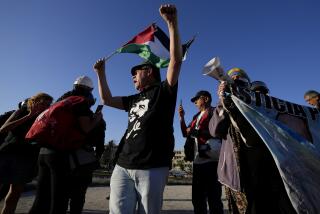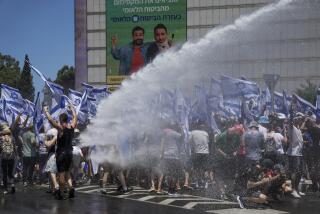Street protests follow approval of Egypt’s draft constitution
CAIRO -- Egypt awoke to fresh protests Friday against the draft of a new constitution and a president who refuses to rein in his power after more than a week of unrest, economic tumult and searing political division.
President Mohamed Morsi is defending his expanded power and a much-criticized proposed constitution as necessary to hold parliamentary elections and advance Egypt’s political transition. But opposition groups accuse Morsi and his Muslim Brotherhood of pushing an authoritarian agenda that lacks bold visions to inspire an Arab world undergoing great change.
Tens of thousands of demonstrators in Tahrir Square found new outrage after the Islamist-led constitutional assembly, in a rushed session, approved a draft charter just after dawn. The proposal could go to a national referendum as early as mid-December, despite complaints from opposition leaders that the document edges the nation closer to Islamic law and does not represent all Egyptians.
“I didn’t sleep in the streets of Tahrir in the past to have a constitution cooked up by one segment of society,” said Ahmed Saeed, a business owner. “This is too much. If this constitution is passed, Egypt will become a Brotherhood nation.”
Protesters streamed into squares in many cities, including Alexandria and Mahalla, a mill town with a strong labor movement. Marches converged on Tahrir from across Cairo following Friday prayers. The Free Egyptians Party founded by Coptic Christian telecommunications billionaire Naguib Sawiris strung a banner that read: “Egypt is for all Egyptians.”
Mohamed Soliman, a member of the opposition Popular Egyptian Current, said: “We intend to remain [in the square] and spend the night until the president retracts the decree and allows for a representative constituent assembly.”
Many say sustained protests will further damage the credibility of Islamists amid months of uncertainty. Such is the political limbo Egypt has become as courts go on strike, the stock market wobbles, prices rise and power outages skip across cities and villages amid whispers of new gas and water shortages and a peel-back of government subsidies.
“The Muslim Brotherhood and Morsi can never call themselves a revolutionary power anymore,” said Saeed. “Their popularity in Egypt’s street has diminished. They are almost alone now. People’s approval for them has died out because they’ve lied one lie after another.”
ALSO:
Qatar poet gets life in prison after ‘insulting’ emir
Egypt passes rushed draft of constitution amid popular anger
U.N. vote on Palestine status inflicts new divides in Europe, NATO
More to Read
Sign up for Essential California
The most important California stories and recommendations in your inbox every morning.
You may occasionally receive promotional content from the Los Angeles Times.











